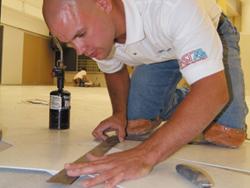Retail Survival Guide: Installation - November 08
By Sonya Jennings
Jim Walker, founding member of the International Certified Floor Covering Installers Association, is incredibly passionate about the importance of the relationship between the retailer and the installer.
According to Walker, one of the most important things retailers should realize is that the installer is an extension of their business. The customer makes no distinction at all between the installer and the retailer. Anything and everything the installer does in the home of the customer reflects on the retailer. When a retailer truly understands this, he or she is much more likely to invest a lot of time, energy, and thought into who is installing products and how they are performing that job.
Walker states, “Many retailers shoot themselves right in the foot by not fully understanding this concept. If an installer goes into a home and does not make the customer comfortable and happy, there will be no referral regardless of how well you did at your store.” Referrals and reputation are the lifeblood of any small business, and the installer can literally stop that at the door.
The first step to creating a top-notch installation program is hiring the right crews. Whether they work for the business or are subcontracted, a business owner should ask the following questions:
1. How long have you installed flooring? (Ask for a list of references and actually call those references.)
2. Are you familiar with CFI 104/105 (the minimum standard set by the industry for the installation of carpet)? If not, where do you get your standards? Have you attended any schools or clinics such as the Armstrong, Mohawk, or Shaw clinics? Do you have certificates from those clinics?
3. What do you wear to the job site? What does your truck look like? (Make sure these present the image you want to project.)
4. Do you own a power stretcher for installing carpet, and do you use it?
5. How do you handle a recall or problem? (It should be within 72 hours if this is within the customer’s convenience time frame.)
6. How long do you guarantee your work? (A minimum two years, three is better.)
According to Walker, every retailer must have his or her own standards for installation. He notes, “This is your store, everything reflects on you, so you must be very clear in communicating your installation standards. You absolutely cannot let an installer tell you what your installation guidelines are going to be.” Once your installation guidelines are written down, the installer should sign an agreement to follow these standards. The standards should address appearance of the installation truck/van, appearance of crew (be specific, for example, “clean shirt with collar and sleeves, no body piercings”), job site prep work, and installation techniques—an example for carpet would include replacing damaged tack strip, seam sealing and power stretching. If these standards are not written down and signed off on by the installation crew, it’s just hit or miss—with lots of misses—as to whether or not standards will be met at the job site.
For the mutual profitability of both you and your installation it’s a good idea to track installation performance. Walker suggests that, after installation, either have the installer leave a survey with a self-addressed stamped store envelope, or have someone from the store make a follow-up phone call. The store representative should ask detailed questions to ensure the customer is satisfied and the crew followed the installation standards. Many successful retailers reward their installation crews with recognition and cash bonuses if their customer satisfaction ratings are consistently favorable. This gives the installer an incentive to follow the installation guidelines and take good care of the customer.
Walker points out that selling installation should be part of the sales process in the store. If you want to differentiate your business from the big box stores, talk about installation. Big box stores send the cheapest crew they can find, and they care very little about the quality and professionalism of those crews. Retailers can point out to the customer, “We care a great deal about the professionalism of our installation crews. Our crew will treat your home as if it were their own, they do quality work, and they have a clean, professional appearance.” Women respond to this because they do not want a haggard looking installation crew showing up at their front door. Retailers underestimate the importance of the installation crew to the female customer in particular.
Another way to sell installation in the showroom is to point out some of the craftsmanship details of the flooring installations in your own store. Point out a hidden carpet seam, a hardwood border or a ceramic inlay. A salesperson can point out the hidden details and promote the experience level and credentials of your installation crew by saying, “Now only a quality crew can do this in your home. If you hire a big box store to install your flooring, do not be surprised if your floor looks very different.”
Some of the most popular complaints concerning installation are lack of cleanup, baseboard and doorway damage, attitude and appearance of the installer, and (with carpet) visible seams. All of these are addressed when a retailer hires a professional crew that has signed off on specific store standards.
If the industry raises the level of installation customer satisfaction, it has a better chance of seeing independent retailers thrive. Walker states, “When you take the time and spend the money to hire professional crews, you will see more referrals, and word of mouth will grow your business.”
|
STANDARDS FOR INSTALLERS |
|
Here are a few standards that should be in every retailer's detailed list of standards:
|
Copyright 2008 Floor Focus
Related Topics:Armstrong Flooring, Shaw Industries Group, Inc., Mohawk Industries
